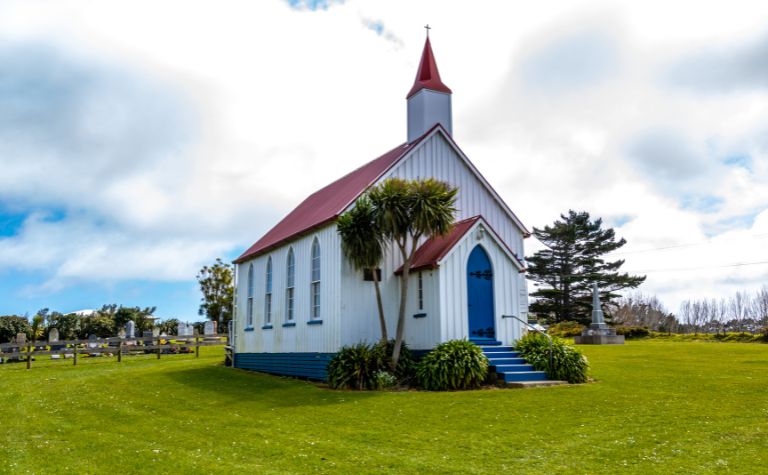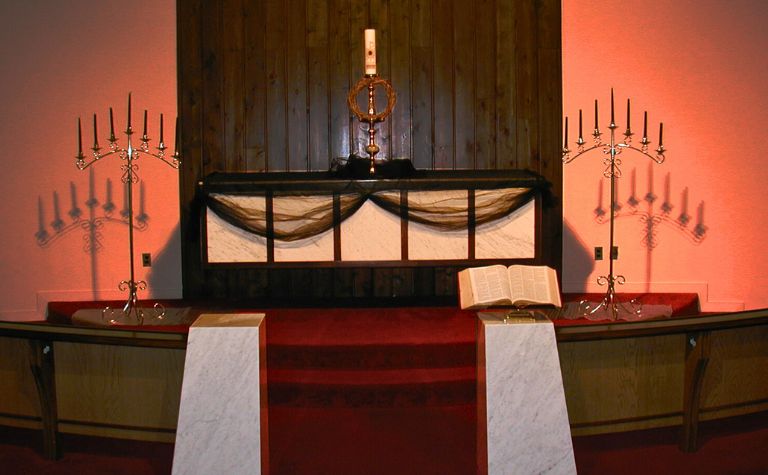Methodism is a Protestant Christian tradition rooted in the 18th-century evangelical revival led by John Wesley. It emphasizes free-will theology and personal and social holiness and uses the Wesleyan Quadrilateral as a guide for theological understanding.
Methodists adhere to Arminian doctrine, emphasizing free will in salvation. The Wesleyan Quadrilateral guides faith exploration using Scripture, tradition, reason, and experience. They believe in progressive sanctification towards perfection, honor two sacraments, and emphasize social holiness.
How does Arminian theology compare to the Calvinist doctrine on salvation? Why is the Wesleyan Quadrilateral important? What is “Christian perfectionism” in Methodism? Keep reading to learn the answers to these questions and others.
Also, compare Methodism with other churches on the Christian Denominations Comparison Chart.

Methodists Subscribe to Arminian Theology
Methodists typically follow Arminian theology, emphasizing human free will in salvation, and reject the Calvinist doctrine of predestination.
| Predestination | Free Will / Arminianism | |
|---|---|---|
| Key Belief | God, in His sovereignty, has predestined certain individuals to salvation before the foundation of the world. | God, in His love and justice, has given humans the free will to choose or reject Him. Salvation is offered to all but must be accepted by the individual. |
| Divine Sovereignty and Human Freedom | Divine sovereignty is emphasized. Human free will is seen as limited or bound by our sinful nature. | A balance between divine sovereignty and human free will is maintained. Humans have genuine freedom to respond to God’s grace. |
| Grace | Grace is irresistible – those whom God has chosen cannot ultimately resist His call to salvation. | Grace is resistible – individuals can resist God’s call to salvation and choose to reject Him. |
| Atonement | Limited atonement – Christ’s death is seen as effectively securing salvation for the elect. | Unlimited atonement – Christ’s death is seen as making salvation possible for all, but effective only for those who choose to accept it. |
| Security of Salvation | Perseverance of the saints – those who are truly saved will continue in faith and cannot lose their salvation. | Conditional security – it is possible for a believer to fall from grace if they turn away from Christ. |
Wesleyan Quadrilateral is Important to the Denomination
The Wesleyan Quadrilateral is a methodological framework used in Methodist theology to understand and interpret Christian faith and practice.
The term was coined by Albert C. Outler, a 20th-century Methodist theologian, although the concept reflects the approach of John Wesley. The quadrilateral includes four sources:
Scripture: This is the primary source of theological authority for Methodists. It’s seen as the inspired word of God and is the first place Methodists turn for guidance on issues of faith.
Tradition: This includes the historical interpretations of Scripture and the practices of the Christian Church throughout history. Tradition provides a historical context for interpreting the Bible and understanding the Christian faith.
Reason: This involves the use of rational thought and logical reasoning in understanding and applying the Scriptures. Wesley did not see any conflict between faith and reason and believed that rationality and intellect were gifts from God to be used in service of understanding Him.
Experience: This refers to personal and communal experiences of God’s grace, particularly as they relate to one’s own salvation and personal relationship with God.
While Scripture holds primacy, tradition, reason, and experience also play vital roles in shaping a comprehensive and coherent theology. Methodists see this approach as providing a balanced, thorough way of exploring and understanding their faith.
Also, compare Methodism with Roman Catholicism to learn more.

Sanctification and Perfection
Wesley taught that Christians should strive for perfection, understood as being so filled with love for God and neighbor that sin ceases to rule one’s life. Sanctification is seen as a process that continues after justification.
The opposite of the Methodist view of sanctification can be seen in traditions that understand sanctification as a one-time, immediate event rather than a gradual, ongoing process. Here’s a comparison:
| Methodist View | Opposite View | |
|---|---|---|
| Sanctification | Seen as a progressive work of God and man that makes us free from sin and like Christ in our actual lives. Also known as “Christian perfection” or “perfect love.” | Seen as a one-time, immediate work that follows justification. It is considered as a state of being set apart for God, but not necessarily involving moral perfection. |
| Role of Believers | Believers must actively participate in sanctification through prayer, worship, reading of Scripture, and other means of grace. It’s a cooperative work between God and believers. | Believers are more passive recipients of sanctification. God accomplishes it at the moment of salvation or shortly thereafter. Human effort is less emphasized. |
| Role of Grace | God’s grace is continually needed and received throughout the believer’s life. This enables believers to grow in holiness and strive toward perfection in love. | God’s grace is imparted to the believer once at the moment of justification or baptism, effecting immediate sanctification. The emphasis is less on ongoing growth. |
What Sacraments Do Methodists Practice?
Methodists recognize two sacraments – Baptism and Holy Communion. They believe in both infant and adult baptism, and communion is typically open to all believers, not just Methodists.
The Methodist view of Baptism includes both infant and believer’s baptism. In contrast, Baptists and other similar traditions only practice believer’s baptism.
Baptism in Methodism
| Methodist View | Baptist View | |
|---|---|---|
| Subjects of Baptism | Both infants and adults can be baptized. Infant baptism signifies the prevenient grace of God and the child’s inclusion in the covenant community. Adult baptism signifies a profession of personal faith. | Only individuals who have made a personal profession of faith are baptized (believer’s baptism). Infants are not baptized as they cannot yet understand or respond to the gospel. |
| Meaning of Baptism | Baptism is a means of grace and a sacrament, marking the person’s initiation into the Church community. It’s not necessarily seen as tied to the moment of personal salvation. | Baptism is an outward sign of an inward change, symbolizing the believer’s faith in Christ, repentance of sin, and identification with Christ’s death, burial, and resurrection. It often closely follows personal conversion. |
| Mode of Baptism | It can be performed by sprinkling, pouring, or immersion, depending on the situation and choice of the candidates or their parents. | Typically performed by immersion, symbolizing death to sin and resurrection with Christ. |
Communion in Methodism?
The Methodist understanding of the Lord’s Supper (or Communion) can be contrasted with that of the Roman Catholic Church. Here’s a comparison:
| Methodist View | Roman Catholic View | |
|---|---|---|
| Nature of the Lord’s Supper | Methodists see it as a means of grace through which God’s love is experienced. While Christ’s presence is real, it’s understood to be spiritual rather than physical. This is sometimes called “real presence.” | Catholics believe in transubstantiation, where the bread and wine become the actual body and blood of Christ, although the appearances (or “accidents”) of bread and wine remain. |
| Frequency of Celebration | While practices vary, the Lord’s Supper is generally celebrated frequently, but not necessarily at every service. | The Eucharist (their term for the Lord’s Supper) is central to the Mass and is celebrated at each service. |
| Who Can Partake? | Communion is typically open to all who are drawn to Christ, regardless of denomination. This is called “open communion.” | Only baptized Roman Catholics in a state of grace (not conscious of any grave sin) are typically allowed to partake. This is “closed communion.” |
| Role of the Clergy | Ordained clergy or appointed laity can preside over the Lord’s Supper. | Only ordained priests can consecrate the bread and wine during the Eucharist. |
Also, see Methodism vs. Lutheranism: What’s the Difference? to learn more.

Social Holiness in Methodism
The Methodist tradition, with its roots in the teachings of John Wesley, has a long-standing commitment to social holiness. This term reflects the belief that personal faith should be expressed in communal life, particularly through acts of justice, mercy, and advocacy.
Caring for the Poor: John Wesley taught that practical acts of kindness, especially towards those in need, were a crucial part of living a Christian life. Methodists are encouraged to support charitable initiatives, volunteer their time, and work towards reducing poverty.
Many Methodist churches have outreach programs focused on serving the poor in their local communities and around the world.
Working for Justice: Methodists believe that Christians have a responsibility to challenge injustice wherever it exists. This can include a broad range of issues, such as racial and gender equality, fair trade, criminal justice reform, and more.
Methodists see this pursuit of justice as a reflection of God’s own concern for justice, as revealed in the Bible.
Advocating for Societal Change: In addition to addressing immediate needs and specific injustices, Methodists also believe in advocating for broader societal change.
This might involve lobbying for policy changes, participating in peaceful protests, or educating others about important social issues. The goal is to create a society that better reflects the values of the Kingdom of God.
All of these practices reflect the Methodist belief that faith is not just a private, personal matter. Instead, it’s something that should transform every area of life, including our relationships with others and the wider society.
They see the Gospel not only as a message of personal salvation but also as a call to transform the world in light of God’s justice and mercy.
Also, see Methodism vs. Anglicanism: What’s the Difference? to learn more.
Related Questions
The Methodist Church and the Roman Catholic Church both value doctrine and practice. Both traditions also believe they faithfully follow the teachings of Jesus of Nazareth, and they agree on...
The Methodist and Baptist branches of Protestant Christianity have left indelible marks on the Western world. Not only have the traditions planted churches, but they have positively contributed to...
